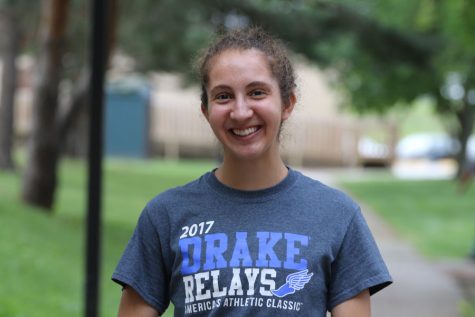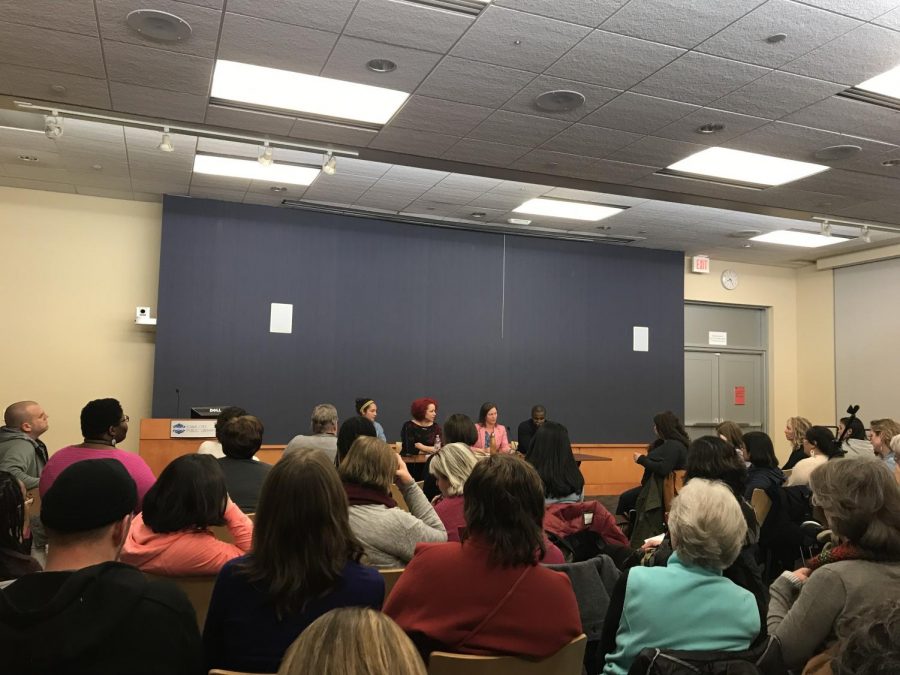New York Times reporter visits Iowa City
Nikole Hannah-Jones, an Iowa native who now writes about racial segregation in schools for the New York Times, visited Iowa City on April 2. She held a panel discussion at the Iowa City Public Library about these issues.
University of Iowa College of Education Assistant Professor Leslie Locke speaks on the efforts to attract diverse students to pursue a degree in education on Mon., April 2. Panelists from left to right: Maya Durham, Nikole Hannah-Jones, Leslie Locke and Kinsley Botchway.
Imagine being a mother of color, living a block away from one of the poorest and most segregated schools in New York City in arguably one of the most under-financed public school districts in the United States. Despite attempting to speak with educators and school representatives week after week, no improvements ensue. In fact, not only do these same administrators ignore the requests, but politicians around the country also portray you as someone who does not care about your child’s education.
This was the picture New York Times reporter and Waterloo West High School graduate Nikole Hannah-Jones painted at Monday night’s community discussion, describing her own experience of sending her child to this exact school. Joining her on the panel were Leslie Locke, an assistant professor at the University of Iowa’s College of Education, Kingsley Botchway, the director of equity and engagement for the ICCSD and Maya Durham ’19, a student at City High and one of the leaders of Students Against School Shootings.
Education was the forefront of the discussion, with Hannah-Jones advocating for a need to continue sustained efforts to lessen the gap between races by focusing on equity, not equality. According to Hannah-Jones, equity means giving what is needed to a group of people whereas equality is homogenizing the assistance.
“Most of what drives racial inequality is not rational thought; it’s irrational thought,” she said.
Hannah-Jones brought up the moral argument, to which she had a message to so-called advocates who vocally support the issues instead of working to enact change. “Live that value for a change,” she said. “We can’t say that this system is unfair and then act in ways that sustain that system.” Her comment was met with an overwhelming eruption of applause in the room.
Kirkwood Elementary School fifth-grade teacher Jessica Harper attended the meeting, addressing the issues she sees in one of the more racially-segregated schools in the ICCSD. According to Harper, her school’s administration has made it a priority to hire educators of color in order to allow the students to better connect with their teachers. However, the African-American applicant pools are dwindling due to the disrespect many teachers of color feel and a majority of minority students not enjoying school.
Botchway advocated for courage and the need for numbers in school board meetings. He also touched on some potential supplements to the list of faculty requirements, suggesting that cultural sufficiency be added to increase the number of culturally-aware teachers.
Ultimately, Hannah-Jones encouraged community members to get involved in the process toward equity.
“Make it politically unpalatable for politicians to ignore this issue,” she said.
Your donation will support the student journalists of West High School. Your contribution will allow us to purchase Scholarship Yearbooks, newsroom equipment and cover our annual website hosting costs.

Deniz Ince is a senior in her third year on the West Side Story staff as the Print Editor-in-Chief and Co-Sports Editor. In her free time, Deniz likes...



